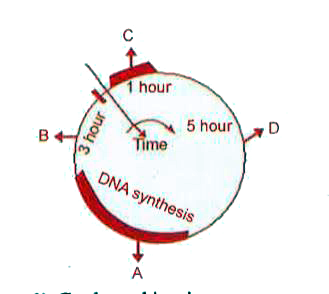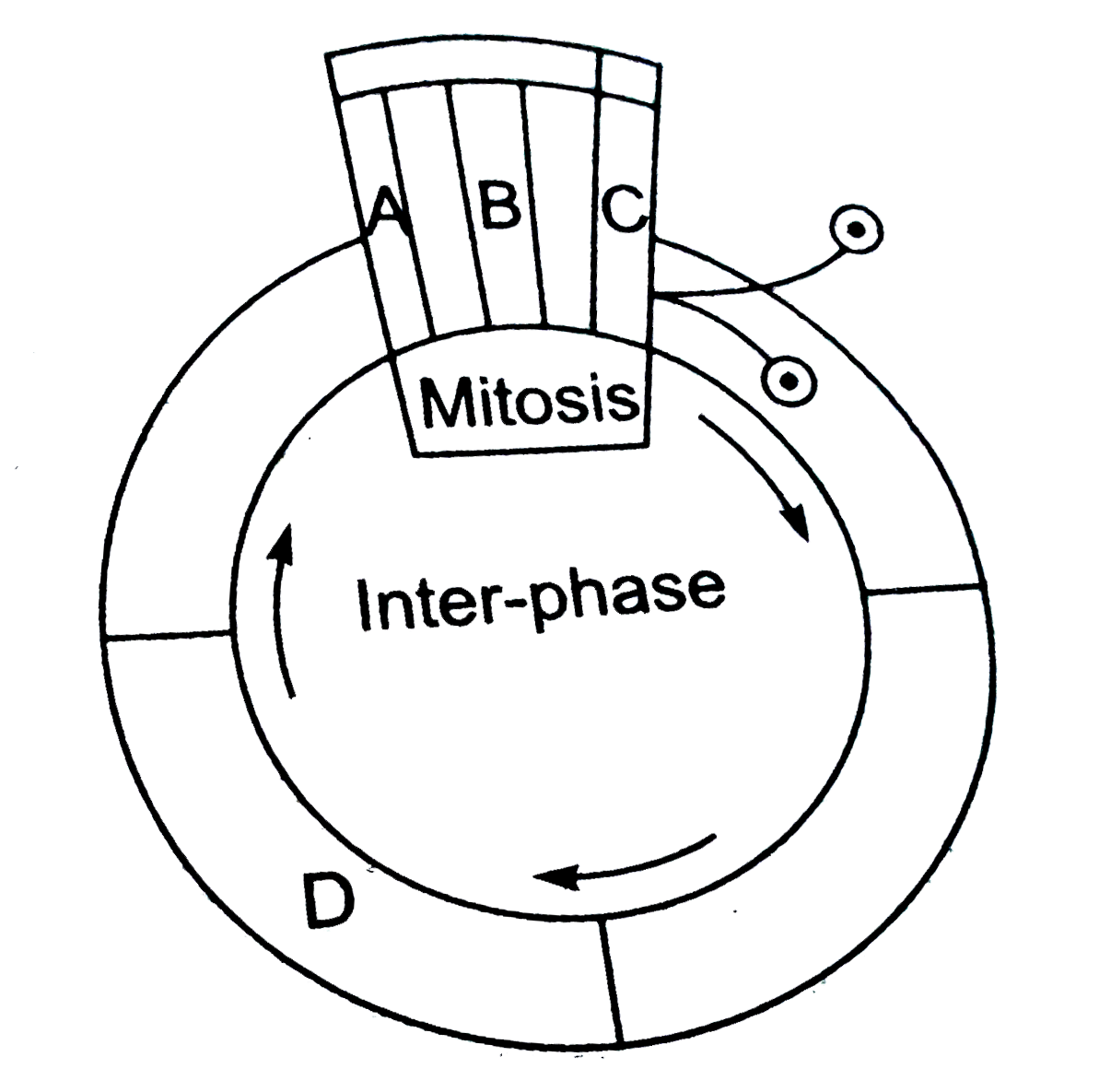G1 stage of interphase of cell cycle shows
Active synthesis of DNA
Active synthesis of RNA
Active synthesis of protein
Both B and C.
The correct Answer is:D
Step-by-Step Text Solution:
1. Understanding the Cell Cycle: The cell cycle consists of several phases, including interphase and mitotic phase. Interphase is further divided into three main stages: G1 (Gap 1), S (Synthesis), and G2 (Gap 2).
2. Identifying the G1 Phase: The G1 phase is the first stage of interphase, occurring before the S phase. It is primarily a growth phase where the cell prepares for DNA replication and cell division.
3. Activities during G1 Phase:
- Cell Growth: During the G1 phase, the cell increases in size and synthesizes various components necessary for DNA replication.
- Synthesis of RNA: There is active synthesis of mRNA during the G1 phase. This mRNA is crucial for the production of proteins.
- Synthesis of Proteins: As mRNA is synthesized, proteins are also synthesized from this mRNA, which are essential for the cell's functions and preparation for division.
4. Clarifying the Role of the S Phase: It is important to note that the actual synthesis of DNA occurs during the S phase, not the G1 phase. Therefore, any option suggesting active DNA synthesis in G1 is incorrect.
5. Conclusion: The correct answer to the question about what the G1 stage of interphase shows is that it involves the active synthesis of RNA and proteins. Thus, the correct option is "both B and C".
Final Answer: The G1 stage of interphase shows active synthesis of RNA and proteins (both B and C).
---
- Cell Growth: During the G1 phase, the cell increases in size and synthesizes various components necessary for DNA replication.
- Synthesis of RNA: There is active synthesis of mRNA during the G1 phase. This mRNA is crucial for the production of proteins.
- Synthesis of Proteins: As mRNA is synthesized, proteins are also synthesized from this mRNA, which are essential for the cell's functions and preparation for division.
Topper's Solved these Questions
- CELL CYCLE (CELL DIVISION)BOOK - DINESH PUBLICATION ENGLISHCHAPTER - CELL CYCLE (CELL DIVISION)EXERCISE - CHECK YOUR GRASP
18 Videos
- CELL CYCLE (CELL DIVISION)BOOK - DINESH PUBLICATION ENGLISHCHAPTER - CELL CYCLE (CELL DIVISION)EXERCISE - BRAIN TEASERS-III
85 Videos
- CELL CYCLE (CELL DIVISION)BOOK - DINESH PUBLICATION ENGLISHCHAPTER - CELL CYCLE (CELL DIVISION)EXERCISE - BRAIN TEASERS-III
85 Videos
- BIOLOGICAL CLASSIFICATION BOOK - DINESH PUBLICATION ENGLISHCHAPTER - BIOLOGICAL CLASSIFICATION EXERCISE - CYC
13 Videos
- CHEMICAL COORDINATION AND REGULATIONBOOK - DINESH PUBLICATION ENGLISHCHAPTER - CHEMICAL COORDINATION AND REGULATIONEXERCISE - Brain Teasers-V
114 Videos
Similar Questions
Knowledge Check
Which of the following phases of the cell cycle is not a part of interphase?
ASBG1CG0DMAssertion: Prophase is the first stage of mitosis which follows S and G1 phases of interphase.
Reason: Prophase is marked by the intiation of clusters of chromocomes.AIf both assertion and reason are true and reason is the correct explantion of assertionBIf both assertion and reason are true but reason is not the correct explnantion of assertion.CIf assertion is true but reason is false.DIf both assertion and reason are false.
What is G0 (quiescent phase) of cell cycle?
View SolutionWhat is G0 stage of cell cycle ?
View SolutionWhat is G1 phase in cell cycle ?
View SolutionGiven below is a schematic break up of the phases/stages of cell cycle which one of the following is the correct indication of the stage/phase in the cell cycle

View SolutionGiven below is a schematic break-up of the phases/stages of cell cycle. Which one of the following is the correct indication of the stage/phase in the cell cycle?

View SolutionGiven below is a schematic break-up of the phases/stages of cell cycle. Which one of the following is the correct indication of the stage/phase in the cell cycle?

View Solution
